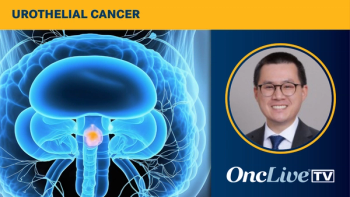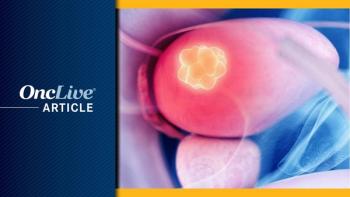
Metastatic Urothelial Carcinoma: Interpreting JAVELIN Bladder 100
A review of the JAVELIN Bladder 100 trial, which evaluated avelumab maintenance therapy following frontline chemotherapy in metastatic urothelial carcinoma.
Episodes in this series

Transcript:
Thomas Powles, MBBS, MRCP, MD: That takes me on to describing the maintenance JAVELIN 100 trial [NCT02603432]. It’s a randomized phase 3 study of patients with metastatic advanced urothelial cancer. Patients were required to have 4 to 6 cycles of standard GEM/CIS [gemcitabine/cisplatin] or GEM/CARBO [gemcitabine/carboplatin] chemotherapy. They were required to have control of disease, so patients who had progression of disease were not eligible. Those patients were excluded because it would be unethical to randomize them against placebo. It was a randomized trial. Patients needed to start or be randomized between 4 and 10 weeks of completion of chemotherapy.
It was a 700-patient study with a 1:1 randomization. The patients were well balanced across the 2 groups. [Approximately] 50% of the patients had visceral metastasis [and approximately] 50% of patients were PD-L1 biomarker positive, for example. And the primary end points were hit both in the ITT [intention-to-treat] population and the PD-L1 population, with a 31% reduction in the risk of death in the ITT population. Progression-free survival was also statistically significant, and that showed a plateau of the curve…at [approximately] 25%. We showed benefit across broad subgroups of patients, irrespective of the type of chemotherapy. The sites of disease, the number of cycles of chemotherapy, the time between finishing chemotherapy and starting avelumab, the PD-L1 biomarker status were benefiting the positive and the negative populations.
It’s a broad population and all of those subgroups seemed to benefit from an OS [overall survival] perspective. The trial also looked at other parameters, of course, including safety, and we showed that [approximately] 10% of patients were stopped because of adverse events. And [approximately] 10% of patients required high doses of steroids. This is very much in line with what you’d expect for other immune checkpoint inhibitors in this environment. The quality-of-life data, which we’ve now broadcast, show no significant detriment associated with avelumab. Now, clearly, there are more adverse events with avelumab than there would be with best supportive care. Nevertheless, it didn’t seem to have a big impact on validating quality of life, per questionnaires such as the EQ-5D [EuroQol Group Health] questionnaire.
I think more recent data [have] looked at biomarkers. We haven’t been able to show, consistently, a single biomarker associated with benefit. And, of course, we’d like to look at different biomarkers such as circulating tumor DNA and other components in the future. We haven’t done that yet. Thus, overall, I think it’s fair to say that this is a trial that, in the maintenance setting, appears to be this Goldilocks effect of not too little, not too late, and not too early. And it’s associated with a significant benefit. The lowest hazard ratio we’ve seen in this disease was a 0.69. Clearly, we all hope that will change in the future, a well-tolerated regime becoming a new standard of care.
Transcript edited for clarity.








































